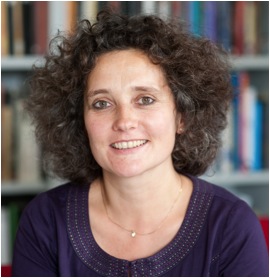
Project Co-ordinators:
Christiane Brosius
 Christiane holds a Professorship of Visual and Media Anthropology at the Cluster of Excellence "Asia and Europe in a Global Context" (www.asia-europe.uni-heidelberg.de) at the University of Heidelberg in Germany. With an additional background in Art History and Art Education, she started to be interested in contexts of art production, dissemination and consumption. Christiane researched and published on the German cultural historian Aby Warburg who developed the 'Mnemosyne Image Atlas', which had an impact on Tasveer Ghar's focus on popular culture and image itineraries (1999). For her second book Empowering Visions. A Study on Videos and the Politics of Cultural Nationalism in India (London: Anthem Press 2005), Brosius explored the iconography, performative rhetoric and production context of video propaganda of the Hindu Right (late 1980s - early 1990s). With the third monograph, Brosius proceeded to study social spatialisation and the mediatisation of 'world class cities' in the context of Delhi (India's Middle Class. New Forms of Urban Leisure, Consumption and Prosperity. Routledge, New Delhi, 2014, second edition). It carries ethnographic case studies about urban architecture and town-planning, heritage tourism and spiritualism, and lifestyle specialists and magazines. For Tasveerghar, Christiane wrote a visual essay related to her work on urban youth culture, romantic love and media communication in the context of Valentine's Day (The Rhythm of Romantic Love), the monograph is under completion. More recent research has shifted attention to the field of art production, again, with respect to urbanisation processes, the emergence of art events and art activism, both in Delhi and in Kathmandu. The latest monograph emerging from here is produced with artist Sanjeev Maharjan and entitled Breaking Views. Engaging Art in Post-Earthquake Nepal. Kathmandu: Himal Books/Social Science Baha. Since 2016, and made possible through the Anneliese Mayer Research Award of the Humboldt-Foundation to Sumathi, the TG-team is working on a new edition of visual essays on 'Manly Matters'.
Christiane holds a Professorship of Visual and Media Anthropology at the Cluster of Excellence "Asia and Europe in a Global Context" (www.asia-europe.uni-heidelberg.de) at the University of Heidelberg in Germany. With an additional background in Art History and Art Education, she started to be interested in contexts of art production, dissemination and consumption. Christiane researched and published on the German cultural historian Aby Warburg who developed the 'Mnemosyne Image Atlas', which had an impact on Tasveer Ghar's focus on popular culture and image itineraries (1999). For her second book Empowering Visions. A Study on Videos and the Politics of Cultural Nationalism in India (London: Anthem Press 2005), Brosius explored the iconography, performative rhetoric and production context of video propaganda of the Hindu Right (late 1980s - early 1990s). With the third monograph, Brosius proceeded to study social spatialisation and the mediatisation of 'world class cities' in the context of Delhi (India's Middle Class. New Forms of Urban Leisure, Consumption and Prosperity. Routledge, New Delhi, 2014, second edition). It carries ethnographic case studies about urban architecture and town-planning, heritage tourism and spiritualism, and lifestyle specialists and magazines. For Tasveerghar, Christiane wrote a visual essay related to her work on urban youth culture, romantic love and media communication in the context of Valentine's Day (The Rhythm of Romantic Love), the monograph is under completion. More recent research has shifted attention to the field of art production, again, with respect to urbanisation processes, the emergence of art events and art activism, both in Delhi and in Kathmandu. The latest monograph emerging from here is produced with artist Sanjeev Maharjan and entitled Breaking Views. Engaging Art in Post-Earthquake Nepal. Kathmandu: Himal Books/Social Science Baha. Since 2016, and made possible through the Anneliese Mayer Research Award of the Humboldt-Foundation to Sumathi, the TG-team is working on a new edition of visual essays on 'Manly Matters'.
More on the chair of visual and media anthropology and Christiane's CV....
Sumathi Ramaswamy
.jpg) Sumathi is Professor of History at Duke University, Durham, North Carolina, USA. Her interest in popular visual culture began in the 1990s when she wrote about the visualizing of the Tamil language as goddess, queen, and mother in her book Passions of the Tongue: Language Devotion in Tamil India (University of California Press, 1997). She also analyzed popular visual representations of Hindi by Tamil nationalists in an essay entitled "Battling the Demoness in Tamil India." In Crispin Bates, ed. Beyond Representations: Colonial and Post-Colonial Constructions of Indian Identity (Oxford University Press (2006), pp. 123-150). Her work took on an all-India focus when she analyzed the visual culture of the iconic figure of Mother India in The Goddess and the Nation: Mapping Mother India (Duke University Press, 2010; Zubaan, 2011). Along the way, she edited a volume on popular visual culture titled Beyond Appearances: Visual Practices and Ideologies in Modern India (Sage, 2003), and co-edited Empires of Vision: A Reader (Duke University Press, 2014). More recently, she has become interested in Indian modernists and contemporary artists, in particular the work of Maqbool Fida Husain on whom she has published considerably (see her Husain’s Raj: Visions of Empire and Nation (Marg, 2016), and an edited volume, Barefoot Across the Nation: Maqbool Fida Husain and the Idea of India (Routledge, 2010; Yoda Press, 2011).) Currently, she is working on a comparative and collaborative digital humanities project titled “No Parallel? The Fatherly Bodies of Gandhi and Mao.” To read more about Sumathi’s other academic interests, you can visit her Duke webpage at https://scholars.duke.edu/display/per4744582. For Sumathi’s essays on Tasveer Ghar, see When a language becomes mother/goddess.
Sumathi is Professor of History at Duke University, Durham, North Carolina, USA. Her interest in popular visual culture began in the 1990s when she wrote about the visualizing of the Tamil language as goddess, queen, and mother in her book Passions of the Tongue: Language Devotion in Tamil India (University of California Press, 1997). She also analyzed popular visual representations of Hindi by Tamil nationalists in an essay entitled "Battling the Demoness in Tamil India." In Crispin Bates, ed. Beyond Representations: Colonial and Post-Colonial Constructions of Indian Identity (Oxford University Press (2006), pp. 123-150). Her work took on an all-India focus when she analyzed the visual culture of the iconic figure of Mother India in The Goddess and the Nation: Mapping Mother India (Duke University Press, 2010; Zubaan, 2011). Along the way, she edited a volume on popular visual culture titled Beyond Appearances: Visual Practices and Ideologies in Modern India (Sage, 2003), and co-edited Empires of Vision: A Reader (Duke University Press, 2014). More recently, she has become interested in Indian modernists and contemporary artists, in particular the work of Maqbool Fida Husain on whom she has published considerably (see her Husain’s Raj: Visions of Empire and Nation (Marg, 2016), and an edited volume, Barefoot Across the Nation: Maqbool Fida Husain and the Idea of India (Routledge, 2010; Yoda Press, 2011).) Currently, she is working on a comparative and collaborative digital humanities project titled “No Parallel? The Fatherly Bodies of Gandhi and Mao.” To read more about Sumathi’s other academic interests, you can visit her Duke webpage at https://scholars.duke.edu/display/per4744582. For Sumathi’s essays on Tasveer Ghar, see When a language becomes mother/goddess.
Yousuf Saeed (Project Director)
.jpg) Yousuf is an independent filmmaker and researcher based in Delhi. He started his career in educational television (with the Times of India) in 1990, co-directing the science series Turning Point for Doordarshan, and moved on to make documentaries on a variety of subjects. Some of his prominent films include Inside Ladakh, Basant, Yashpal: A Life in Science, and the Train to Heaven which have been shown at numerous film festivals, academic venues and on TV channels. Besides films and television, Yousuf also worked for Encyclopedia Britannica (India) as the Arts Editor. He has been a Sarai Fellow (2004), the Asia Fellow (2005-06) and the Margaret Beveridge Senior Research Fellow (at J.B.Media Resource Centre, Jamia Millia, New Delhi, 2009). His recent works are a feature length film Khayal Darpan about the state of classical music in Pakistan and Campus Rising, a documentary about the recent students' struggle in Indian universities. Yousuf is the author of Muslim Devotional Art in India (Routledge) and Partitioning Bazaar Art (Seagull), besides other publications. He looks after the overall design and update of the Tasveer Ghar website. He was a member of the Cluster of Excellence: Asia and Europe in Global Context of the Heidelberg University for a project on Muslim popular iconography (2009-11) as well as a Visiting Scholar at Stanford University, U.S. More details...
Yousuf is an independent filmmaker and researcher based in Delhi. He started his career in educational television (with the Times of India) in 1990, co-directing the science series Turning Point for Doordarshan, and moved on to make documentaries on a variety of subjects. Some of his prominent films include Inside Ladakh, Basant, Yashpal: A Life in Science, and the Train to Heaven which have been shown at numerous film festivals, academic venues and on TV channels. Besides films and television, Yousuf also worked for Encyclopedia Britannica (India) as the Arts Editor. He has been a Sarai Fellow (2004), the Asia Fellow (2005-06) and the Margaret Beveridge Senior Research Fellow (at J.B.Media Resource Centre, Jamia Millia, New Delhi, 2009). His recent works are a feature length film Khayal Darpan about the state of classical music in Pakistan and Campus Rising, a documentary about the recent students' struggle in Indian universities. Yousuf is the author of Muslim Devotional Art in India (Routledge) and Partitioning Bazaar Art (Seagull), besides other publications. He looks after the overall design and update of the Tasveer Ghar website. He was a member of the Cluster of Excellence: Asia and Europe in Global Context of the Heidelberg University for a project on Muslim popular iconography (2009-11) as well as a Visiting Scholar at Stanford University, U.S. More details...
In addition, the Tasveer Ghar cannot thrive without the contribution of our authors.
 Tasveer Ghar: A Digital Archive of South Asian Popular Visual Culture
Tasveer Ghar: A Digital Archive of South Asian Popular Visual Culture